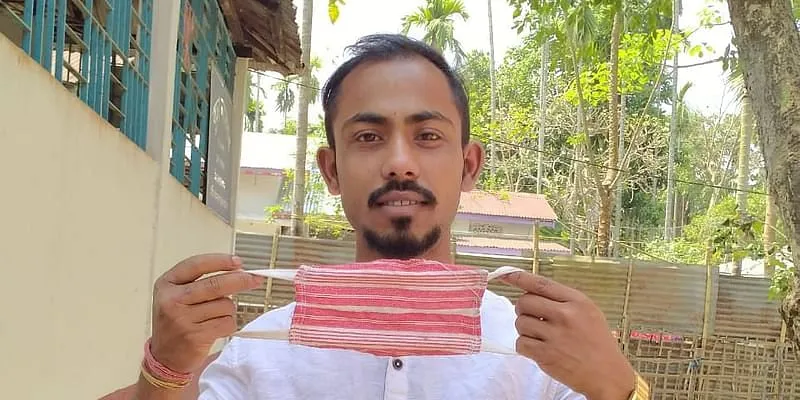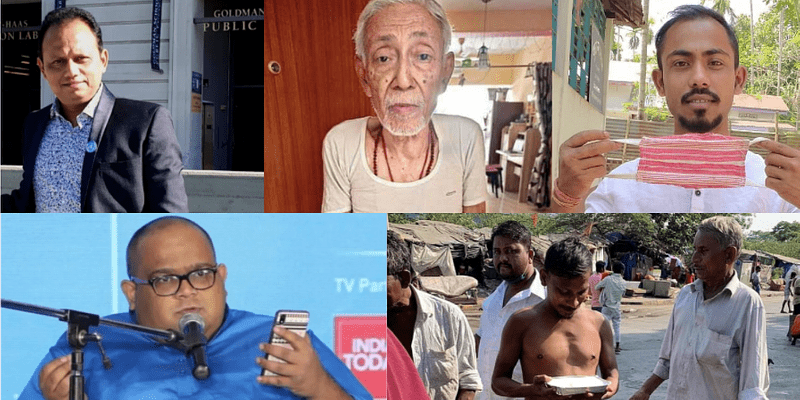From making face masks at home to donating from pension amount to fight coronavirus - this week’s top social stories
Even during such challenging times, this week's social stories show continued effort to strive for the greater good
Indians are three weeks into a nationwide lockdown imposed to curb the spread of coronavirus. Over the last week, many philanthropic acts and inspiring initiatives were launched. From an 82-year-old man donating from his pension to the PM-CARES Fund, to a startup teaching people how to make face masks at home, here are this week’s top five social stories.
Coronavirus: This Assam startup is teaching people how to make face masks at home
The demand for hand sanitisers and face masks is at an all-time high and many places are facing an acute shortage. To help deal with the situation, Brahmaputra Fables is making masks and teaching people how to make them with easily available materials.

Cotton face mask
The organisation has made a tutorial video that shows how easily one can make a mask. The team is also spreading awareness among the locals.
The masks are stitched using normal cotton material with three layers of protective cloth. These masks are then sanitised as directed by health workers and design experts. This year, the startup also encouraged people to gift a mask stitched with gamosa, a traditional cloth used by the people of Assam, through its ‘GiftAMask' campaign.
This 82-year-old man’s contribution to fighting coronavirus has moved the nation
Subhash Chandra Banerjee, an 82-year-old professor, lives at his home behind Kolkata’s Dum Dum International Airport. He invited officers who were part of a patrol team from the Airport Police Station by waving his hand from the balcony.

Subhash Chandra Bannerjee
He told them that he wanted to contribute money to initiatives being taken to fight the coronavirus pandemic. The officials advised him to contribute to the PM-CARES Fund following which Subhash contributed Rs 10,000 to the fund from the money he had saved from his pension.
Coronavirus: How Swiggy distributed over 20 lakh meals across 18 cities during lockdown
To counter the impact of the coronavirus pandemic, Bengaluru-based foodtech unicorn Swiggy recently launched the ‘Hope, not hunger’ initiative to support the Delhi government’s programme to feed the needy.

'Hope, not hunger': Swiggy initiative
This crowdfunded initiative has served more than 150,000 meals in a day and aims to serve at least 500,000 meals a day. Served as lunch and dinner, these meals are packaged in a way that they are wholesome. Each meal has an adequate quantity of rice, dal, and vegetables to ensure that the nutritional needs of an individual are met.
A donation of Rs 250 can provide a day’s meal to a family of four. To contribute to the ‘Hope, not Hunger’ initiative, click here.
How coronavirus crisis has made it difficult for people with disability to cope with daily tasks
Abhishek Anicca is a Delhi-based writer and poet who lives alone. He suffers from scoliosis, a sideways curvature of the spine, causing the lower part of his body to become immobile and numb.
“I have somehow been managing to cook meals and clean the house myself which is a taxing process. It drains me physically and mentally. Some of my friends are helping me with the purchase of groceries and vegetables,” Abhishek Anicca told SocialStory.
Moved by the plight of Abhishek and many others like him, the National Centre for Promotion of Employment for Disabled People (NCPEDP) tweeted helpline numbers and an email ID that people with disabilities could reach for aid.

Abhishek Anicca
The Department of Empowerment of Persons with Disabilities (GOI) also issued certain disability-inclusive guidelines for the protection and safety of people with disabilities during the outbreak.
This man has been donating his salary for over 10 years to revive tribal art and culture in India
Shubhasish’s love and fascination for rural culture and tribal life began at a young age. He got an opportunity to explore it for himself in 2011 when he was working with Tata Steel in Jharkhand.

Shubhashish
“Since Jharkhand is known to be home to many tribal groups like Munda, Santhal, and Oraon, I used to go out to meet them every weekend. I observed their indigenous practices, lifestyle, and traditions,” Shubhashish told SocialStory.
His first movie ‘Sa – The Search’ delves into the singing and painting traditions of the tribes in Jharkhand. His second movie ‘Magical Script’ throws light on ‘Ho’, a tribal language that has its roots in Ranchi and West Singhbhum. Both his films were screened at the Tribal India International Festival organised by the Central University of Jharkhand.
Edited by Javed Gaihlot







![[Weekly funding roundup] Investments into startups decline by 57 pc, closes at $107 million](https://images.yourstory.com/cs/2/f08163002d6c11e9aa979329348d4c3e/Weeklyimage-1577460362436.png)


![[Exclusive] Vauld to seek 3-month moratorium extension as creditors panel explores bailout options](https://images.yourstory.com/cs/2/a09f22505c6411ea9c48a10bad99c62f/VauldStoryCover-01-1667408888809.jpg)